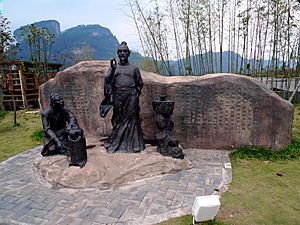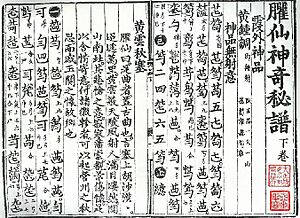Zhu Quan facts for kids
Quick facts for kids Zhu Quan朱權 |
|||||||||
|---|---|---|---|---|---|---|---|---|---|

Statue of Zhu Quan in Wuyi Mountain Tea Theme Park
|
|||||||||
| Prince of Ning (寧王) | |||||||||
| Reign | 1391–1448 | ||||||||
| Successor | Zhu Dianpei, Prince Jing | ||||||||
| Born | 27 May 1378 | ||||||||
| Died | 12 October 1448 (aged 70) | ||||||||
| Issue |
|
||||||||
|
|||||||||
| Father | Hongwu Emperor | ||||||||
| Mother | Imperial Concubine Yang | ||||||||
| Occupation | Historian, military commander, musician, playwright | ||||||||
Zhu Quan (simplified Chinese: 朱权; traditional Chinese: 朱權; pinyin: Zhū Quán; born May 27, 1378 – died October 12, 1448) was a very talented Chinese prince. He was known as the Prince of Ning (simplified Chinese: 宁王; traditional Chinese: 寧王; pinyin: Nìngwáng). Zhu Quan was the 17th son of the Hongwu Emperor, who started the Ming dynasty.
During his life, he was a skilled military commander and a historian. He also wrote plays and composed music. People remember him as a great expert on tea and a player of the guqin, a Chinese string instrument.
Contents
Other Names for Prince Zhu Quan
Besides being called the Prince of Ning, Zhu Quan had many other names. One of his titles was the Strange Scholar of the Great Ming (大明奇士, Da Ming Qi Shi).
He also used special names, called aliases, because he followed Taoism. Taoism is a Chinese philosophy that sometimes involves trying to live forever. Some of his Taoist names included the Emaciated Immortal (臞仙, Qúxiān) and the "Master who Encompasses Emptiness" (涵虚子, Hánxūzi).
The Life of Prince Zhu Quan
Zhu Quan began his career as a military leader. He served his father, the Hongwu Emperor, who founded the Ming dynasty. In 1391, he was given a special area to rule, called a fief. This area was Ning, with its main city at Daning.
Prince Zhu Quan was famous for being good at both art and war. He played an important part in a big family conflict. This happened when his young nephew, the Jianwen Emperor, became emperor in 1399.
Conflict with the Emperor
The Jianwen Emperor was advised by his officials to call his uncle, Zhu Quan, to the capital city, Nanjing. Zhu Quan was careful because other uncles had been removed from power or even executed that year. He refused to go. Because of this, he lost three of his army divisions.
Another uncle, Zhu Di, the Prince of Yan, was planning his own uprising against the emperor. Zhu Di knew Zhu Quan was a strong leader with well-trained soldiers. He needed to make sure Zhu Quan wouldn't be a problem.
A Clever Trick and New Home
Zhu Di used a trick. He pretended to be defeated and in trouble near Daning. After a few days, Zhu Di's soldiers were ready. They captured Zhu Quan when he was saying goodbye to his brother.
Official records say that Daning was emptied, and Zhu Quan's family and staff were moved. Zhu Quan himself was kept in Zhu Di's capital, Beiping. However, Zhu Di also burned the entire city of Daning. This destroyed Zhu Quan's huge library.
Life After the Uprising
After being captured, Zhu Quan helped his brother, Zhu Di, in his uprising. The History of Ming says that Zhu Di promised to share the whole empire with Zhu Quan.
But after Zhu Di became the Yongle Emperor in 1402, he broke his promise. He did not give Zhu Quan control over important cities like Suzhou. Instead, he offered Zhu Quan less important places. Zhu Quan chose Nanchang, the capital of Jiangxi.
Later, Zhu Quan was falsely accused of practicing wugu sorcery (a type of magic). After this scare, he mostly stopped getting involved in politics. He decided to spend his time on cultural activities instead.
Prince Zhu Quan's Cultural Pursuits
Zhu Quan met daily with scholars. He was very interested in finding a way to live forever, as part of his Taoist beliefs. He loved and improved his book, Secret Book of Origins. This book survived the fire at Daning. It strongly criticized Buddhism, calling it a foreign religion.
His large book about Taoism, Most Pure and Precious Books on the Way of August Heaven, was so respected that it became part of the official Taoist canon. His brother, the emperor, even asked him to finish another book called Comprehensive Mirror of Extensive Essays.
Zhu Quan also wrote many other books, including:
- Family Advice
- Ceremonial Customs of the Country of Ning
- The Secret History of the Han and Tang
- History Breaks Off
- A Book of Essays
- A Book of Poetry
His most famous book was his Tea Manual (茶谱, Chá Pǔ), which was about tea. He also paid to have many rare books published and wrote several operas.
Zhu Quan is very important in the history of the Chinese guqin (zither). In 1425, he put together a book called Manual of the Mysterious and Marvellous (神奇秘谱, Shénqí Mì Pǔ). This is the oldest large collection of guqin music that we still have today.
Prince Zhu Quan's Family
Zhu Quan had one main wife and several children.
Wife:
- Lady Zhang (張氏): She was the daughter of Zhang Tai, a military commander. She passed away before Zhu Quan did.
Sons:
- 1st son: Zhu Panshi (born 1395 – died 1437). He was the Hereditary Prince of Ning.
- 2nd son: This son died when he was young.
- 3rd son: Zhu Panye. He was first the Prince Kangxi of Linchuan, but later lost his title.
- 4th son: Zhu Panyao (born 1414 – died 1492). He was the Prince Anjian of Yichun. His mother was Lady Wang.
- 5th son: Zhu Panzhu (born 1419 – died 1459). He was the Prince Anxi of Xinchang. His title was later removed because he did not have a son, but he did have a daughter.
- 6th son: Zhu Panmou (born 1420 – died 1439). He was the Prince Daohui of Xinfeng. His title was also removed because he did not have a son. His mother was Lady You.
Daughters: Zhu Quan had many daughters, who were given titles like "Princess." Some of them married important officials.
- 1st daughter: Princess Yongxin
- 2nd daughter: Princess Yushan
- 3rd daughter: Princess Qingjiang
- 4th daughter: Princess Fengxin
- 5th daughter: Princess Jinxi
- 6th daughter: Princess Taihe
- 7th daughter: Princess Pengze
- 8th daughter: Princess Luling
- 9th daughter: Princess Xinyu
- 10th daughter: Princess Xincheng
- 11th daughter: Princess Fuliang
- 12th daughter: This daughter died young and did not receive a title.
- 13th daughter: Princess Nanfeng
- 14th daughter: Princess Yongfeng
Descendants of Prince Zhu Quan
Zhu Quan's family line continued through his sons.
- 1st Prince: Zhu Quan, Prince Xian of Ning
- Hereditary Prince: Zhu Panshi, Prince Hui of Ning
- 2nd Prince: Zhu Dianpei, Prince Jing of Ning
- 3rd Prince: Zhu Kunjun, Prince Kang of Ning
- 2nd Prince: Zhu Dianpei, Prince Jing of Ning
- Hereditary Prince: Zhu Panshi, Prince Hui of Ning
* 4th Prince: Zhu Chenhao, Prince of Ning
Zhu Quan is also an ancestor of the famous Chinese painter Zhu Da.
 | Isaac Myers |
 | D. Hamilton Jackson |
 | A. Philip Randolph |


